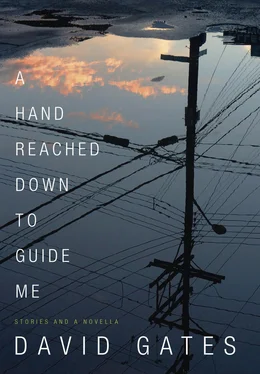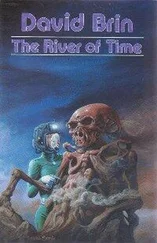David Gates - A Hand Reached Down to Guide Me
Здесь есть возможность читать онлайн «David Gates - A Hand Reached Down to Guide Me» весь текст электронной книги совершенно бесплатно (целиком полную версию без сокращений). В некоторых случаях можно слушать аудио, скачать через торрент в формате fb2 и присутствует краткое содержание. Жанр: Современная проза, на английском языке. Описание произведения, (предисловие) а так же отзывы посетителей доступны на портале библиотеки ЛибКат.
- Название:A Hand Reached Down to Guide Me
- Автор:
- Жанр:
- Год:неизвестен
- ISBN:нет данных
- Рейтинг книги:5 / 5. Голосов: 1
-
Избранное:Добавить в избранное
- Отзывы:
-
Ваша оценка:
- 100
- 1
- 2
- 3
- 4
- 5
A Hand Reached Down to Guide Me: краткое содержание, описание и аннотация
Предлагаем к чтению аннотацию, описание, краткое содержание или предисловие (зависит от того, что написал сам автор книги «A Hand Reached Down to Guide Me»). Если вы не нашли необходимую информацию о книге — напишите в комментариях, мы постараемся отыскать её.
magazine anointed “a true heir to both Raymond Carver and John Cheever.”
A Hand Reached Down to Guide Me Relentlessly inventive, alternately hilarious and tragic, always moving, this book proves yet again that Gates is one of our most talented, witty and emotionally intelligent writers.
A Hand Reached Down to Guide Me — читать онлайн бесплатно полную книгу (весь текст) целиком
Ниже представлен текст книги, разбитый по страницам. Система сохранения места последней прочитанной страницы, позволяет с удобством читать онлайн бесплатно книгу «A Hand Reached Down to Guide Me», без необходимости каждый раз заново искать на чём Вы остановились. Поставьте закладку, и сможете в любой момент перейти на страницу, на которой закончили чтение.
Интервал:
Закладка:
My brother says he knows the moment when his old life ended and his new life began: when he heard his own voice asking What is God’s will for me? and yanked the piece of rubber tubing from around his arm. Fine: he’s constructed the narrative he needed. I won’t say he’s lucky, but if I’m going to bring my own story to an end—look how little of it is left—while making it seem to have some sort of shape, I’ll need to fasten on some more or less random moment and claim that right there was the point before which and after which. My plan had been to bring it around in a circle, back to that stagy little prayer in the shower, but how bogus would that have been? So let’s go with the day I packed up the rest of my stuff in that half town house where I’d left my first husband, to put it in storage while I made up my mind whether or not to move into the beautiful house I would share with the man who would be my second husband, the beautiful house we would leave for the more beautiful house, the house he’d wanted for himself, the house in which I would leave him: the maddest thing I’ve ever done, the most willful, the most necessary. Anyway, it was the morning of January 2, and my husband would be getting in from New Mexico at five o’clock. It had snowed the night before; they hadn’t yet plowed the parking lot or shoveled the walks, and I didn’t have my boots. I put clothes in suitcases, then went through the books one last time—that Dubliners had been mine, One Hundred Years of Solitude definitely his, Lolita probably mine but I could always get another copy. Then I remembered the print of van Gogh’s Starry Night . He’d said it was his favorite painting, and he’d given me the print for my birthday—oh, not some cheesy poster, but a “framed canvas art print”—and naturally I’d put on a show about how it was my favorite too, but my God. I’d had him hang it in the bedroom—better that than having it out where visitors could see it. I went in and looked at the thing: Could you imagine hanging this next to a Diebenkorn? So I left it for him, in all generosity. And there’s my moment, okay? Not that I could have turned back at that point.
So I carried the boxes and suitcases out, loaded them into the trunk and the backseat, put the note and key on the counter, let the door lock behind me, then drove fishtailing through the snow in my little car, with its bald tires, my feet wet, fiddling with the vents to blow warm air onto my hands, into the life to come.
—
Late one afternoon, when it was too cold to walk to the beach anymore, she and I drove there in the Subaru—I’d be putting it in the paper in another month, as soon as the lawyer could get the title from him—and parked in the lot that had cost a dollar an hour back during the summer. The gate was up, the booth was empty and there was only one other car. We walked down, through heavy sand, then over hard sand, to where shallow waves washed in from the bay—we couldn’t afford the ocean side. Far down the beach, a man with a dog; otherwise we were alone. She had her hands in the pouch of her sweatshirt, her hood up; strands of black hair blew around her chin. “Somehow this has lost its allure,” she said.
“We could go south,” I said.
“We are going south,” she said. “Ha ha.”
I saw a piece of dull green sea glass among the shells, dead crabs and Styrofoam cups. I squatted down and handed it to her. She held it up to the sky, then dropped it back in the sand.
“I’ve already got a lifetime supply of this. What are we even doing , you know?”
“Maybe we should think more about moving to Boston,” I said. “You said there was a music scene.”
“What would you do?”
“I don’t know. I’m just throwing it out as something.”
“You used to be this great writer,” she said.
“When was that ?”
“It’s the first thing he said about you.”
Now that the man was closer, I could see he had on a nylon tracksuit, that his dog was a chocolate Lab. He kept stopping to toss a tennis ball into the waves and wipe his hand on his pants; the dog, wet all over, kept bringing it back, dropping it on the sand and dancing back from it.
“Your father lives in his own universe,” I said. “Are you worried that I’m going to be dead weight?”
“That’s not what I’m saying.” She looked over at the dog. “This is amazing. Isn’t it going to get hypothermia or something?”
“Are you kidding?” I said. “They live for this.”
“I need to meet that dog.” She walked over to the man; I thought I’d better come along. “Is it a boy?”
“As you see,” the man said.
“Doesn’t he get cold?”
“Yeah, you’d think,” the man said. “He never seems to mind.”
“Can I pet him?” She put out her hand; the dog picked up the ball, dropped it and danced back.
“I’m afraid Joey’s a little obsessed right now.” He reached down and threw the ball into the waves; the dog leaped in after it.
“I wish I was that single-minded.” She turned to me. “I want to go back, okay?”
I started the car and turned on the heater, but it blew cold air and I turned it off again. She reached in her bag and brought out Rumours . “Here, this’ll cheer us up. We can drive around and get warm, do you want to?”
“You miss your life,” I said.
“I don’t know,” she said. “Don’t you miss yours?”
And I said, in old-timer voice, “ Not yet .”
An Actor Prepares

Last summer, on a plane back from Frankfurt, I happened to look up at an overhead screen while trying to learn my lines in Twelfth Night , and for a second I thought I saw myself in a promotional video for Singapore Airlines, among a crowd at JFK two weeks earlier. They couldn’t possibly have produced this so fast, could they? But there was the distressed-leather jacket, the mirrored sunglasses, the gray hair—silver, let’s call it—and the Profile: ah, still a handsome devil. (I’d been going to see a twenty-eight-year-old German woman I’d met in New York, who said if I came over she’d figure out something to tell her boyfriend.) Just this afternoon I told an old friend—someone I’ve known for years, at any rate—that this was the moment I knew I had to quit acting. I’d studied myself on tape however many hundreds of times and never had I been so convincing: Who wouldn’t cast this guy as the old lech on his last go-round?
My father was a film editor—to begin this at the beginning—who’d worked with Stanley Donen and William Wyler, and I really was a handsome devil when I was in my twenties; I might have made it as a B-list male ingénue, saved my money and lived on a beach the rest of my life. But when I was thirteen, my parents took me on a trip to the East Coast, where we saw Nicol Williamson’s Hamlet on Broadway. My father, to his credit, or not, never tried to talk me out of moving to New York; he even paid for my first year at the Circle in the Square Theatre School. I put in my time as Mortimer Brewster and Professor Harold Hill back in the days of dinner theaters, and I played Bernardos and Franciscos at this or that Shakespeare festival. One summer I was so broke I took the bus to Massachusetts to work as an “interpreter” at Plimoth Plantation, speaking Pilgrimese (“How are you faring this day?”) and affecting puzzlement when tourists—we were to refer to them as “strange visitors”—tried to get me to break character. I’m proud to say that I never appeared in The Fantasticks , either on the road or down on Sullivan Street, though I took TV work when I could get it: a blind date in an episode of Kate & Allie and a corrupt lawyer in Law & Order . I was understudy to the guy who played A Gent when they brought back The Cradle Will Rock; he never missed a night, so I never got to do that first-act number with Patti LuPone. Fifteen years ago, all this amounted to enough of a résumé to get a job at a SUNY branch, teaching what they were pleased to call theater arts; I took the train up to Westchester three mornings a week, a reverse commute among people who seemed to be domestic workers.
Читать дальшеИнтервал:
Закладка:
Похожие книги на «A Hand Reached Down to Guide Me»
Представляем Вашему вниманию похожие книги на «A Hand Reached Down to Guide Me» списком для выбора. Мы отобрали схожую по названию и смыслу литературу в надежде предоставить читателям больше вариантов отыскать новые, интересные, ещё непрочитанные произведения.
Обсуждение, отзывы о книге «A Hand Reached Down to Guide Me» и просто собственные мнения читателей. Оставьте ваши комментарии, напишите, что Вы думаете о произведении, его смысле или главных героях. Укажите что конкретно понравилось, а что нет, и почему Вы так считаете.











